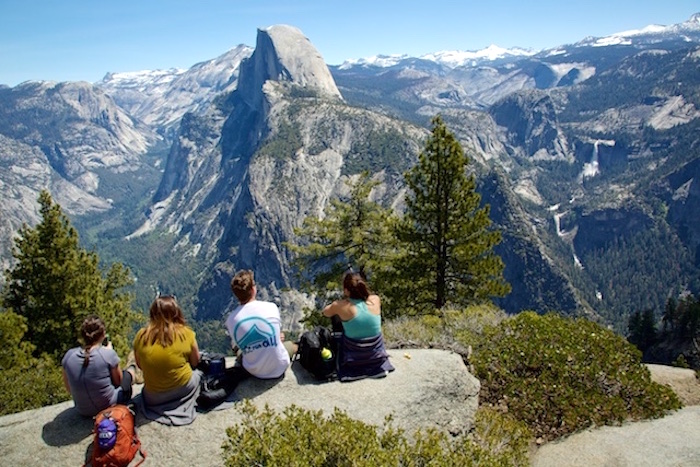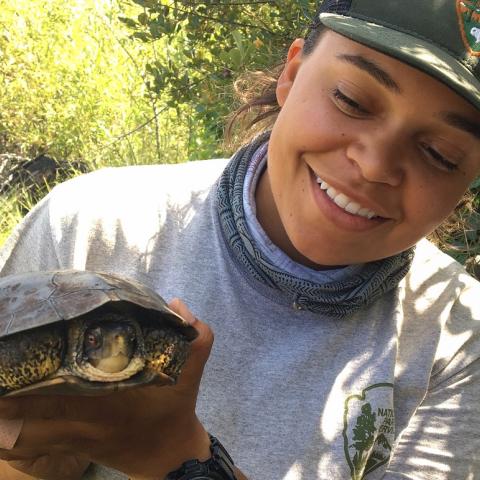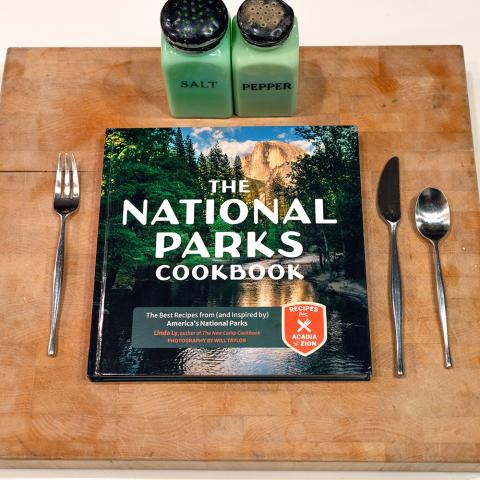Editor's note: As part of National Parks Traveler's Centennial Series, Utah-based writer Frederick H. Swanson makes an argument for ensuring national parks play a role in educating, and nurturing, youth.
The slide projector whirred on the table next to my desk as Mrs. Sampson, our fourth-grade teacher, worked the balky advancement mechanism. She had purchased the Kodachromes in strips from a gift shop during her summer vacation, and the images on the screen transfixed me: vertical cliffs of white granite, waterfalls misting in midair, pine trees rising from a grassy riverbank. I had never heard of, let alone seen, such a place. The thought that I might someday visit Yosemite National Park did not enter my head at the time. All I knew was that this was a far more intriguing place than the cornfields that lay beyond my suburban Iowa home.
Fast forward nearly four decades: my wife and I hang back in the small crowd of tourists who have signed up for the ranger-led walk through the Fiery Furnace in Arches National Park. We smile as our six-year-old daughter positions herself up in front, right on the heels of the ranger as he leads us through the maze of Entrada Sandstone fins. When he climbs up on a boulder to point out some feature in the cliff, Ellie scrambles up beside him and solemnly looks us over as if she were next to speak. Stashed away in her pink vinyl backpack is a Junior Ranger booklet, which she will complete during our stay. Tomorrow we’ll stop by the visitor center, where she will raise her right hand and swear to protect this national park and educate others about its many wonderful features.
My family moved to Oregon a few years after I saw my teacher’s slides of Yosemite, and the following summer we went camping in our Sears canvas tent at Crater Lake National Park. I could not have known at the time, but my future wife would be in the same park that month, taking part in her family’s Western vacation. Years later, as a college student, she would work summer jobs in Yellowstone and Grand Teton, following the example set by her mother, a bus driver, who spent her summers ferrying tourists around those magnificent parks. The experience convinced both of them to leave Delaware and move out West. Thus have the national parks exerted their pull on two American families.
In my late adolescence I fancied myself a mountaineer and wilderness explorer; the national parks were too crowded for my taste and I sniffed at the tourist hordes jamming the boardwalks and overlooks. Not until my wife and I had a child did I come to appreciate the tremendous service the national parks offer to any American parent: a place to vacation that will not only hold a young person’s interest, but one that can awaken wonder and inquisitiveness about our native world. Ellie collected 13 Junior Ranger badges over the course of six or seven years, ranging from Grand Canyon to Glacier, on as many trips as we could squeeze into school vacation periods.
She gained something else besides: an appreciation for the outdoors and the natural world that seems to have lodged pretty deep within. I was impressed by those guys and gals at Arches; after we toured the Fiery Furnace, we joined another ranger, a botanist, for an evening walk along a nondescript track below the cliffs. She pointed out how junipers sent their roots down 80 feet to gather water, and how the delicate gray soil crust sent out filaments that held the loose sand together in the spring wind. This was not the gee-whiz of Yosemite’s thankfully-discontinued firefall, or even Old Faithful erupting. These government employees were explaining things I had not known about the desert’s richly varied ecosystems, its mysterious geologic processes, its exquisitely fragile flora.

Exploring Arches National Park can ignite a love for geology, or desert landscapes/NPS
When I turned 62 I immediately sent off for my senior parks pass, which at a cost of ten bucks gives me lifetime privileges to more than four hundred national parks, national monuments, and federal recreation areas. This little card is, as a friend said, enough to make it worth growing old. It’s almost too good a bargain. I would not mind--and I think some public-spirited body should pursue this—contributing ten dollars every time I visit a national park, and I think many of my retired peers would gladly do likewise. I would stipulate that the money collected from us oldsters go into a special fund that hires, trains and supports park naturalists. Not to build more boardwalks and comfort stations, or even a new nature center, important as those may be. Earmark the funds for one thing only: direct, hands-on learning in outdoor settings, guided by knowledgeable rangers and other staff and volunteers who are charged with nothing more—and nothing less--than reaching our youth.
Give these good people the means to reach young folks with the stuff of scientific discovery--the exciting finds that are being made in our remaining wild places seemingly every day. No child should have to wait until fourth grade to hear about Yosemite; nor, when they do visit the parks, should their experience be confined to a ten-minute movie in the visitor center, an overused campground, and a couple of brief stops at drive-up overlooks. Let them fall into step behind Ms. or Mr. Ranger; let them search for five species of tree by day and listen for owls at night; let them get away from their parents for a half hour or longer and especially away from the cars and concessions. I think they will stand for it, and some of them will find that it kindles a spark in their soul.
We will need Junior Rangers aplenty, and senior ones too, if we are ever going to tackle the huge job of restoring a bit of nature to our cities, sustaining our farms and fields, and finding ways to live in harmony with the Earth’s wild creatures. Our parks must be more than engines of the tourist economy; more, even, than places to excite awe and wonder in our jaded grown-up heads. Parks are the gateway for our youth to understand and appreciate the natural world. As such, we need to emphasize their role in education. No slide show can do this, nor can a television nature special. Kids want to scuff their knees and scratch their hands on real things, and they need many places in which to do so, including some close to home. The national parks, however, are special. They are where our best science and our best understanding of natural ecosystems can engage the public in an atmosphere conducive to learning and discovery.
Our parks ought to play as large a role in education as any brick-and-mortar institution. The nature I knew in my youth depends on it, and I’m willing to stake ten dollars per visit to help make it happen. Care to join me?
Frederick H. Swanson writes about the public lands of the West from his home in Salt Lake City. He is author of Where Roads Will Never Reach: Wilderness and Its Visionaries in the Northern Rockies (University of Utah Press, 2015). His website is www.fredswansonbooks.com.






 Support Essential Coverage of Essential Places
Support Essential Coverage of Essential Places







Comments
Thanks for a fine essay.